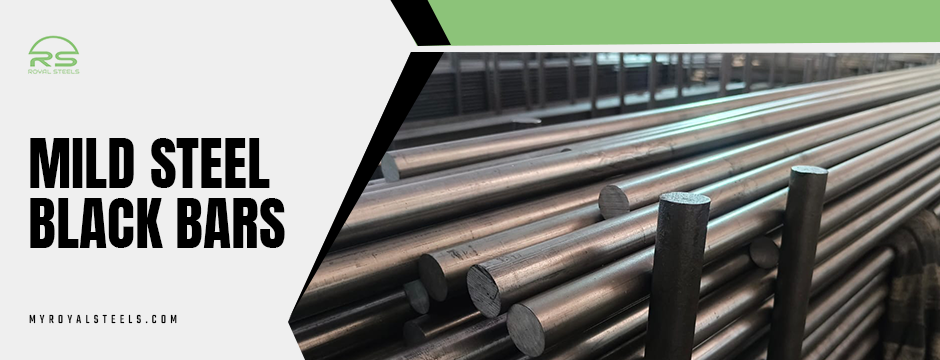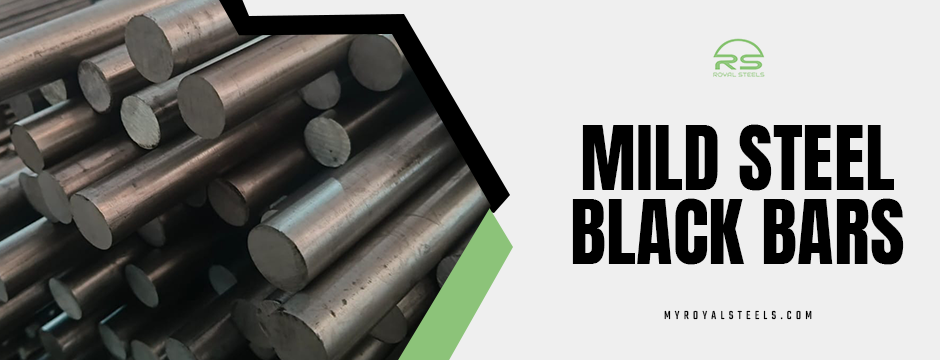Mild steel black bars are widely used in construction, fabrication, automotive, and general engineering due to their durability, affordability, and ease of welding. However, the long-term performance of mild black bars depends largely on their quality and sourcing method. If the bars are not manufactured under strict quality controls or sourced from an unreliable supplier, they may be prone to corrosion, poor tensile strength, or surface imperfections—leading to structural vulnerabilities.
For long-term projects, especially those involving load-bearing or critical infrastructure, it is vital to procure durable and consistent-grade steel bars. This ensures not just safety and stability, but also reduces the need for frequent maintenance or replacement—ultimately cutting down project costs over time. Whether you’re a contractor, fabricator, or procurement manager, knowing how to identify and source the best quality black bars is essential for project success. This blog delves into key tips and industry best practices to help you source mild steel bars that stand the test of time.
Understand the Basics of Mild Steel Black Bars
Before sourcing, it’s important to understand what mild black bars are. These are hot-rolled steel bars with a black oxide scale on the surface (hence the name). They’re made from low-carbon steel, which makes them easy to work with, cut, and weld.
Key properties of steel black bars include:
- High ductility and toughness
- Low tensile strength compared to alloyed steels
- Easily weldable and machinable
- Cost-effective for general fabrication purposes
Applications range from brackets and braces to fences, gates, frames, and structural supports.
Choose the Right Grade of Steel
Not all mild steel black bars are created equal. Depending on your application, the correct grade of steel can make a big difference in durability.
Some common grades used for mild steel bars:
- IS 2062 Grade A/B – Ideal for general structural applications
- EN8/EN9 – Medium carbon steel with better strength and wear resistance
- SAE 1018 – Good for forging, cold forming, and machining
- MS Bright Bars (if tolerance is key) – These are processed further for tighter tolerances
Before purchasing, consult with your structural engineer or project manager to confirm the appropriate grade. Always check if the supplier can provide MTC (Mill Test Certificates) confirming the grade and chemical composition.
Check for Dimensional Accuracy and Surface Quality
Durable black bars must be uniform in thickness, length, and shape. Inconsistent bars can result in weak joints, misalignment, or additional fabrication costs.
When inspecting bars or reviewing samples:
- Check for straightness
- Inspect the surface for cracks, rust, or pitting
- Measure dimensions (length, diameter) with callipers
- Ensure consistency across different batches
Even though black bars are hot-rolled and may have minor surface imperfections, excessive flaws are signs of poor quality.
Look for Suppliers With Proven Track Records
Choosing a reliable supplier is perhaps the most crucial factor in sourcing durable mild black bars. Look for vendors who have:
- Decades of experience in steel manufacturing or distribution
- Established clientele in infrastructure, real estate, or heavy machinery sectors
- In-house quality control systems
- ISO certifications or BIS approvals
Also, check online reviews, testimonials, and ratings on platforms like IndiaMART, Google Business, or supplier marketplaces to assess the supplier’s credibility.
Verify Certifications and Compliance
Always request documentation that verifies the quality and origin of the steel bars. This can include:
- Mill Test Certificates (MTC)
- BIS Certification (for compliance with Indian Standards)
- ISO 9001:2015 (Quality Management System)
- Third-party inspection reports, if applicable
These documents help ensure that you’re getting steel that complies with industry standards for chemical composition, mechanical properties, and overall safety.
Ask About Protective Packaging and Delivery Methods

Bright Steel Bars can develop rust if not stored or transported properly. To ensure long-term durability, ask your supplier about:
- Anti-rust coatings or oils
- Bundled packaging with protective layers
- Covered transportation to prevent exposure to moisture
- On-site storage tips
If you’re working in coastal or humid regions, you might also consider galvanised or coated bars for better corrosion resistance.
Compare Prices Without Compromising on Quality
Price matters—but compromising on steel quality to save a few rupees per kilo can cost more in the long run. Poor-quality bars can lead to failures, repairs, and liabilities.
Always compare quotes from multiple trusted suppliers, but prioritise:
- Grade authenticity
- Certification
- Service quality
- Delivery reliability
Also, watch out for unusually low prices—they may indicate recycled or substandard steel.
Consider Value-Added Services
Some suppliers offer added services that can increase efficiency and durability for your project, such as:
- Custom cutting and bending
- Shot blasting and surface treatment
- Inventory management for bulk orders
- Logistics coordination for remote sites
A supplier who goes beyond just delivering steel and supports your project logistics adds long-term value.
Request a Sample or Test Order First
If you’re dealing with a new supplier, always request a sample or place a small test order before committing to bulk procurement.
Use this initial order to:
- Test fabrication compatibility
- Inspect quality consistency
- Assess packaging and delivery timelines
- Verify certifications and documentation
This trial approach reduces risk and ensures you’re partnering with a dependable supplier.
Build a Long-Term Supplier Relationship
Sourcing durable materials is not just about finding the right bars—it’s also about building long-term relationships with the right suppliers. A consistent, trustworthy vendor will:
- Understand your project timelines
- Ensure availability during peak demand
- Offer preferential pricing for repeat business
- Keep you updated on steel market trends and price fluctuations
Such relationships bring more reliability and long-term cost benefits than switching vendors for minor price differences.
End Thoughts
When sourcing mild steel black bars for any long-term application, quality, consistency, and supplier reputation matter just as much as price. By following these tips—understanding the grade, inspecting the quality, ensuring compliance, and building strong supplier ties—you can ensure your investment stands strong for years to come.
If you’re looking for a trusted source of durable mild black bars, Royal Steels is your ideal partner. With years of experience, high-quality manufacturing standards, and a strong commitment to customer satisfaction, we deliver only the best. Whether you need bars for construction, engineering, or industrial use, we ensure you get certified, durable, and competitively priced materials delivered right to your site.

